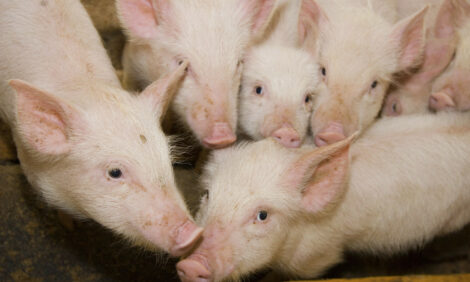



Four macro trends impacting the animal ag biotech space

You may wonder why I chose a cover photo of coding language for a piece on macro trends impacting animal ag biotech industries. It's because I recently participated in the Western Dairy Management Conference in Reno, NV, the Animal Ag Tech Summit (virtually) held in San Francisco, and the IFCN Dairy Tech Mapping Summit and much of the content at these summits centered on the increasing use of data and analytics to advance animal health and productivity.
One of the things I love about my work as the lead for strategy and commercial development at Zoetis's Precision Animal Health business is that I get to learn about new and emerging technologies and then help develop these into innovative products and services that help our customers fulfill their animal health, productivity, and operational objectives. Read on for my view of 4 macro trends that will shape the animal health biotech space now and well into the future:
- Solutions to improve animal health and productivity will be increasingly technology-oriented and enabled. Livestock operations are increasing in size and complexity, and health and productivity solutions that are scalable, cost effective, and that represent a comparatively low level of operational risk will be increasingly attractive to producers. As the pace of industry consolidation increases and consumer preferences influence production practices on several fronts, demand for genetics, diagnostics, and analytics will grow steadily. Diagnostics offer good opportunities for near term improvements in animal health and for fine-tuning the use of traditional treatment products and protocols. Genetics and analytics, on the other hand, represent opportunities to make institutionalized management changes within operations to improve health and productivity outcomes for the long term. Together, these technologies represent comprehensive and measurable ways that livestock producers can ensure they increasingly and responsibly improve animal health and profitability outcomes for the long haul.
- Data management and software engineering capabilities are quickly becoming important for everyone managing animal health and productivity in livestock value chains. Livestock operations are at the same time becoming increasingly complex and required to adapt to changing regulatory and consumer requirements. Because of this, the use of data and health management technologies to achieve operational efficiencies, improve animal health, demonstrate compliance to protocols, monitor and improve productivity, and in doing so create improved margins will become a routine part of the operational mix. Capabilities to develop and implement data and technology products as well as integrating them across herd management and other data tracking and reporting systems will play an increasingly important role throughout the value chain. None of this can be done without engineering, building, maintaining two-way data acquisition, processing, and distribution capabilities.
- Environmental sustainability will be an increasingly important part of the conversation. If there is one common thread across virtually any ag related conference, it is environmental sustainability. Publicly traded companies are beginning to realize that they can advance their own ESG goals by purchasing carbon credits from livestock producers. Producers are realizing there is new, incremental value in the production efficiency and land management improvements they have invested in for years. These fundamental drivers will increase the relevance and value of animal health and productivity solutions that also create demonstrable quantifiable environmental sustainability outcomes.
- Like any other rapidly developing market, there is going to be a lot of noise and uncertainty in the ag tech marketplace. The number of companies, ranging from startup to blue chips, seeking a toehold in the data, analytics, and sustainability arena is noteworthy. This activity, combined with a marketplace that is rapidly evolving and relatively undefined brings three implications to mind:
- First: For companies developing data, productivity, and sustainability solutions - maintaining laser like focus on core capabilities and strategies will be important to avoid costly distraction (see my previous LinkedIn post on Three Critical Mindset Shifts Emerging Biotech Leaders should Embrace for a perspective on the cost of rework).
- Second: Ease of use and customer experience will win. Those solutions that integrate with other relevant platforms, are intuitive and easy to use, and that provide clear benefits in a crowded and evolving environment will be adopted at a faster rate than those that do not.
- Third: Pre-competitive collaboration will accelerate development and downstream adoption of technology, and those companies that find ways to adapt to this will be rewarded by the marketplace.
The increasing relevance of data, analytics, and technology in driving animal health, productivity, and sustainability outcomes for producers implies analogous changes in the organizations that serve these value chains A deep understanding of the customer benefits & implications for the use of technology solutions, from development to install to insights, will be critically important.
Michael Layfield is the Sr. Director of Global Strategy and Commercial Development for Zoetis’s Precision Animal Health business, a fortune 500 animal health company located in Parsippany, NJ. Any views expressed reflect his personal experiences and not that of Zoetis. https://www.linkedin.com/in/mrlayfield
Headline image courtesy of Shahadat Rahman on Unsplash.






